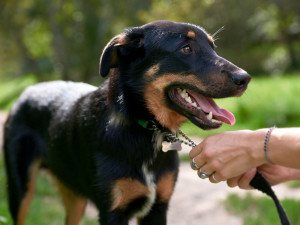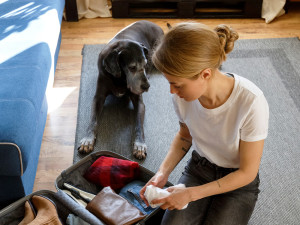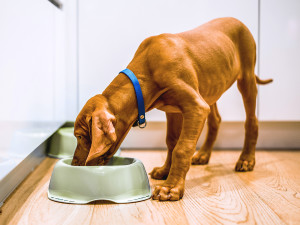7 Important Papers You Should Always Keep on File For Your Pet
It will be super helpful if you ever need a pet-sitter, too.

Share Article
You’ve probably turned your house upside down on the hunt for your passport hours before a flight — we’ve all been there. It’s easy to be disorganized about important documents when we need them so rarely… but when the time when we do need them, a methodized filing system is super valuable. As a new pet parent, you’ll need to be organized about your pup’s papers, and it’s important to get started early.
Whether a Google doc or an old-school accordion folder is more your style, the key is to gather everything pertaining to your pup into one place. It’ll be hugely helpful for your pet sitter, and it’s vital to have in case of emergency. Below is everything you’ll want to collect.
Emergency contacts
In addition to spelling out every possible way to get ahold of you, also include the names and numbers of close friends or family members (give them a heads up) who can be trusted to help in a crisis. Also include the contact information for your primary veterinarian, the nearest 24/7 emergency clinic, and the ASPCA’s Poison Controlopens in new tab hotline; add your trainer, dog walker, and daycare if applicable. If there are any local facilities that you would prefer your dog sitter steer clear of, flag them as well.
Identification documents
This includes your dog’s adoption certificate or pedigree paperwork, microchip number, rabies certificate and/or tag number, and GPS tracker information. It’s wise to also file away a few photos of you and your dog so that if your dog is lost, you can instantly design a flier; if stolen, you have proof of guardianship. Other identifying features to catalog include your dog’s age, breed mix, weight, coat color, and any unique characteristics such as a jowly overbite or eyebrows that rival Eugene Levy’s.

Medical records
It might sound old-school to print out a veterinary record, but the following information should be readily available: proof of your dog’s vaccination history, spay/neuter status, heartworm and flea/tick preventative due dates, surgical history, health conditions, allergies, pet insurance policy forms, and any medications your dog is taking — including schedule, dosing instructions, and tips for administering it.
Dietary instructions
One of the first sets of questions a pet sitter will have for you is when, how often, and how much you feed your dog. Be as specific as possible, noting any special instructions, such as if your ravenous pup requires the use of a slow feeder bowl. And don’t forget a treat allowance!
Grooming needs
If yours is a low-maintenance dog where grooming is concerned, lucky you. It still couldn’t hurt to take note of the frequency of their baths and location of their shampoo, brush, wipes, and other grooming supplies. If you’re a new parent to a polished Poodle or aristocratic Afghan Hound, you’ll want to include your groomer’s information.
House rules
Be upfront about what your dog is and isn’t allowed to do under your roof. Everything from the daily routines (potty schedule) to the fine print (the couch is forbidden territory) applies.
Likes, dislikes, and quirks
Kind of how cilantro tastes like soap to you, your dog has their own oft-questionable preferences. It’s worth keeping a checklist of things they like (squeaky toys, your neighbor’s kids) and dislike (thunderstorms, men with beards), as well as any idiosyncratic quirks or habits such as doing the zoomies at precisely 8 pm.
You’ll see, an organized folder for your dog’s history to date is sure to be worth your while — and it’ll be much appreciated by a dog sitter.

Katherine Tolford
Katherine Tolford writes about the pet industry and veterinary medicine. Her work, which has appeared on PetMD, Chewy, and Floof, has helped pet parents better understand their pets’ health. She’s also a pet parent to Milo, a loud-mouthed tuxedo cat, who likes to attempt backwards somersaults on the couch.
Related articles
![Golden retriever running around a local park during sunset]()
The Macro Benefits of Microchipping Your Dog
Sure, microchips can feel a little 1984. But if your pup has a chip, they’re four times more likely to make it home if they get lost.
![Owner adjusts collar with tags on their dog]()
The Pros and Cons of Getting Your Dog Licensed
Spoiler: there are no cons.
![A woman packing her suitcase with a dog laying nearby.]()
How to Find the Dog Sitter Your Dog Deserves
Nobody loves your dog like you love your dog. But wouldn’t it be great if your dog sitter was a close second?
![brown puppy eating food out of green bowl]()
A Digestible Guide to Healthy Dog Food for Your New Pup
How to pick the right grub for your dog when there are So. Many. Choices.
![woman gives small black dog treat for sitting]()
Your Dog Should Do This 30-Day Training Challenge
It’s like your 30-day yoga challenge — except with way more training treats.
![shiba inu snuggling on couch with woman]()
Money Talks: The Dollars of Dog Parenthood
We crunched some numbers and yup, they’re worth every penny.







